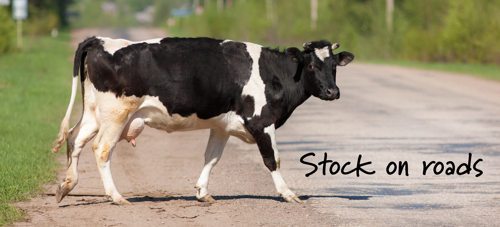Stock
Stock in public places
Animals, bees and poultry kept in urban areas can become a nuisance and be offensive to neighbours unless carefully controlled.
Keeping pigs in urban areas is not permitted in the district. There are also special requirements for keeping poultry in these areas.
Any person having control of stock being moved on any public place in an urban area shall ensure that excrement; urine or other matter deposited upon the public place from such work is removed, and disposed of in an appropriate manner.
Any person being the owner of, or having control of any horse in a public place in an urban area shall immediately remove any faeces deposited by that horse from the public place.
Any person having control of stock or any public place shall ensure that the stock is kept under proper control, with consideration for other persons using the public place.
Wandering stock
Stock can be dangerous if left to wander on roads and it will be impounded. The NZ Transport Authority is responsible for stock on state highways. Stock trespassing on private land may also be impounded.

What to do if you see stock on our roads
Wandering livestock can pose a significant hazard on our roads. If you see livestock loose or lying on our district's roads, please call us immediately on 0800 932 4357.
Once secured, if the owner is not known to you, please contact Council and we will ensure that the correct process is followed under the Impound Act 1955.
--
Keeping our rural roads safe
The safety of people travelling on rural roads is very important. One of the purposes of the Land Transport Bylaw is to establish rules about the movement of stock on roads. Our aim is to ensure that potential danger and inconvenience to other road users is minimised, and to protect the road network.
Council’s Public Places Bylaw requires that people have adequate control of their stock when in a public place, and give consideration for other people using that place. It also requires that owners prevent stock from wandering or being at large.
Council seeks the cooperation of owners to ensure the management and keeping of stock complies with the rules contained in Council’s Bylaws. It is the responsibility of every owner of stock to ensure the animals are adequately confined and do not wander or gain access onto public property.
The owner of stock is responsible for public safety or any damage to public or private property, or injury of stock, which may arise from roaming stock.
Owners of wandering stock can face criminal liability under the Crimes Act 1961 (sections 156 and 157). If a land owner or occupier fails to take necessary steps to ensure their livestock remain adequately fenced in, they will be at risk of endangering the safety or health of the public (especially road users). If their stock causes a crash and negligence is proven, they may be prosecuted.
Wandering stock may be impounded by Animal Control Officers and all costs associated with the impounding (officer time, transportation and sustenance) are recovered from the owner. If the stock is not claimed, it may be disposed of in accordance with the Impounding Act 1955.
Movement of Stock on roads
Farm business operators have a responsibility to take all measures to reduce potential road safety hazards that arise from stock movements. The waste left behind on our roads by stock, creates a very slippery road surface during wet weather.
Our Districts’ tourism industry attracts many visitors, from all walks of life, to take in the many attractions across the Waitomo District. Many of those visitors are not experienced in driving on rural roads and may not be aware of the road hazard created through animal waste deposited on our roads.
By following some simple guidelines when moving stock, the potential hazards to other road users can be significantly reduced...
- Use a removable protective covering for the area of the road surface over which you will move stock. This can be rubberised or plastic matting that is strong but flexible. The mat will reduce the carriage of mud onto the maintained road by stock movement.
- Ensure that there is provision for clearing the debris generated by the crossing of stock from maintained road surfaces after each crossing.
Remember that the road must be left in the same or better condition after stock has been moved across or along the road. WDC reserves the right to remove debris and animal waste from the road surface and recover the costs from the farm business operator. Please consider other road-users.
Stock Underpasses
When a livestock or dairy farm business has an existing or proposed road crossing that is considered to be unsafe, WDC may require a stock underpass.
Section 6.4 of the Land Transport Bylaw sets deadlines for the installation of stock underpasses where certain circumstances exist. One method used for determining the need for an underpass is a roads AADT (annual average daily traffic) - this means a road that usually sees 500 vehicles or more traveling on it every day, every year.
The deadline for the installation of a stock underpass on an existing split dairy farm business that is operated on opposite sides of the road where the AADT is equal to or more than 500 vehicles, was 1 July 2012.
For an existing split dry stock farm business that is operated on opposite sides of the road where the AADT is equal or more than 500 vehicles, the installation a stock underpass must be completed by 1 July 2015.
Further information about how to apply for the installation of a stock underpass, please contact Waitomo District Council.
